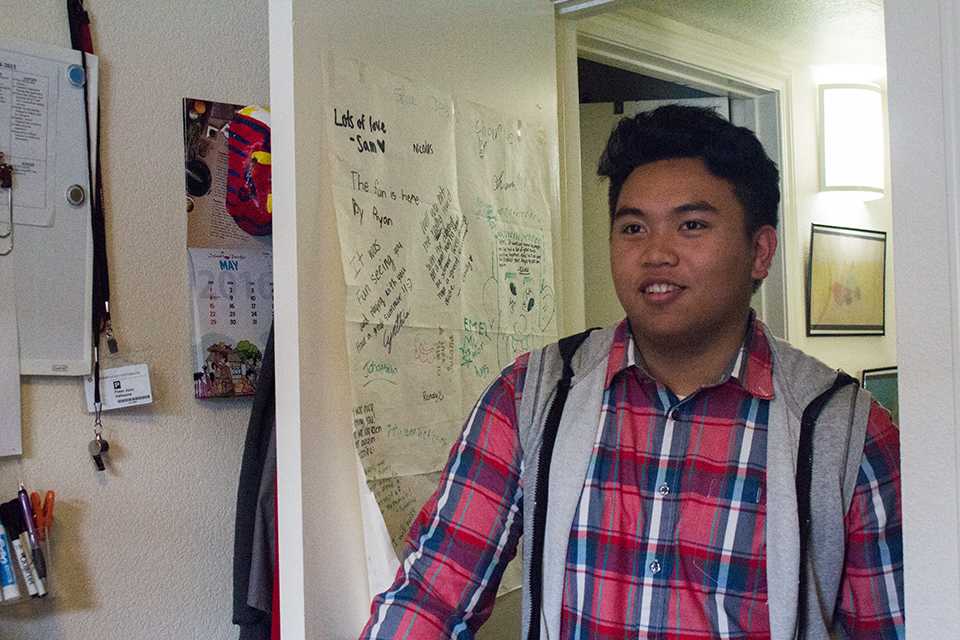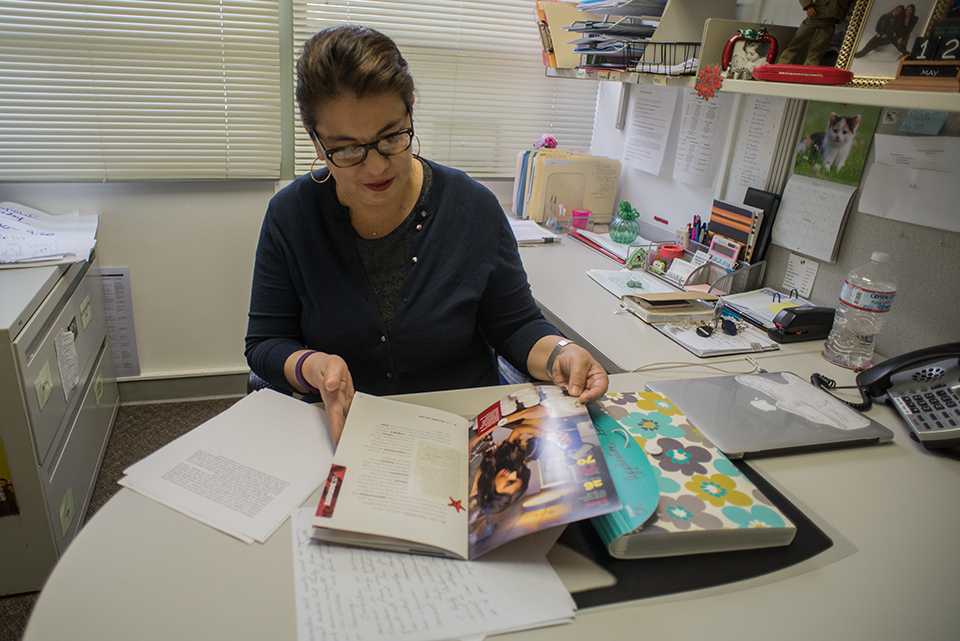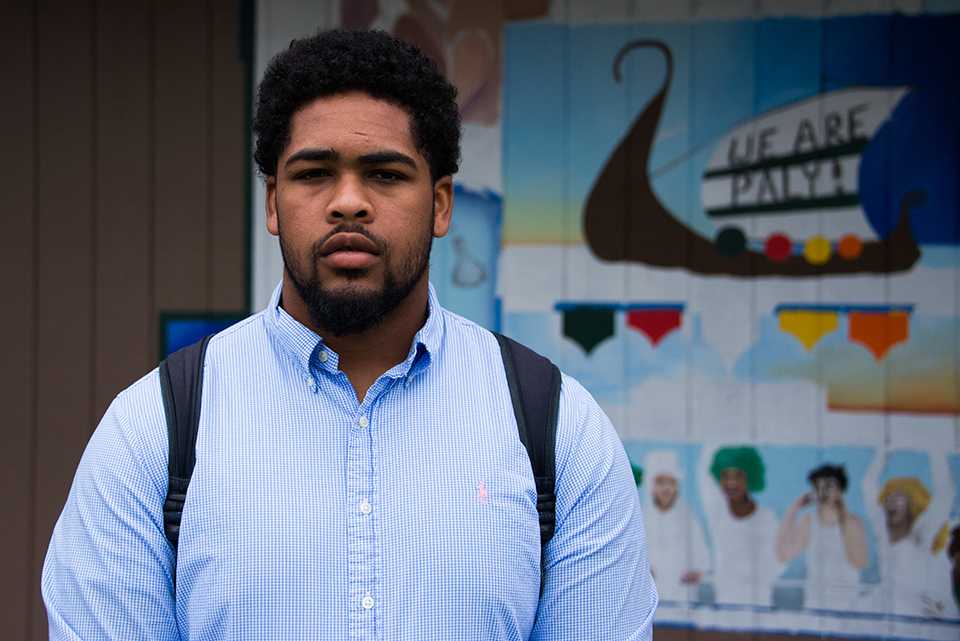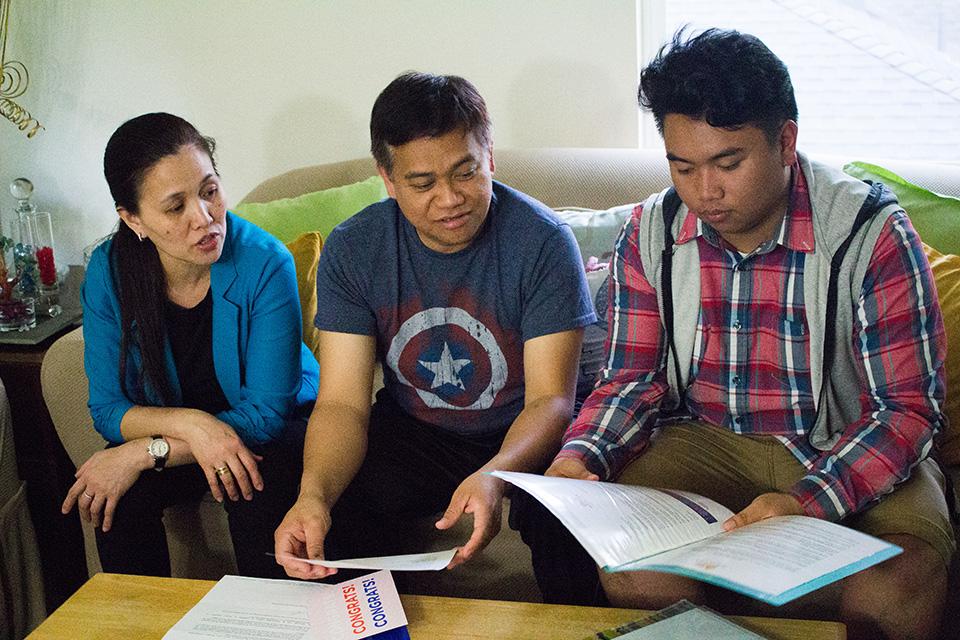When you walk into Palo Alto High School senior Peter Valbuena’s apartment on a weekday evening, his mother, Analiza, will offer you a pair of cushy orange house slippers with maroon gingham lining. As you enter the living room and pass windows with lime green curtains, you’ll hear Analiza and Peter’s father, Peter Sr., chatting in Tagalog about their days — Analiza works as a nurse’s assistant and Peter as a caretaker at the Vi at Palo Alto, a senior citizen residence on Sand Hill Road. Sit down on the couch covered with an ivory blanket and admire the Eiffel Tower, New York City skyline and London Bridge figurines in the corner — attractions on the Valbuenas’ travel bucket list. After asking if they can get you anything to eat or drink, Peter’s parents will tell you about how they no longer go out to dinner, except on special occasions, because they’re saving to send Peter and his sister Patricia to college.
“When he started high school, we [had] started saving already because we don’t want to rely on a grant or scholarship,” Analiza says. “Every year when we have tax refunds, we save it … When they were elementary graders, we used to eat out every week but [I said,] ‘It helps … if you start cutting expenses that are not really needs.’”

Peter will be the first in his family to attend college in the United States when he begins his freshman year at Whittier College in southern California this fall. Both of Peter’s parents have four-year accounting degrees from Filipino universities, but they want their children to receive American four-year college degrees. Since his family immigrated from the Philippines in 2005, Peter has shared his parents’ goal.
“It’s been my motivation to go [to college in the U.S.] and make them proud,” Peter says. “And make sure all their hard work that they did trying to get me all these better opportunities … pays off.”
He’s well on his way. However, as much as it is an accomplishment for a student to have successfully applied, been admitted and committed to a college, the phenomenon of “summer melt” often presents challenges for first-generation college students like Valbuena. Summer melt occurs when students who intend to go to college never end up enrolling because they do not have adequate support from their high schools or various preparatory programs to make the transition from high school to college.
Nationally, 10 to 40 percent of college-intending students, especially those from low-income backgrounds, succumb to summer melt, according to Harvard University’s Strategic Data Project.
Each year, a significant contingent of Paly students is at risk of experiencing the effects of summer melt. In this year’s graduating class, 10 percent, approximately 50 students, could be the first in their families to attend college, according to Sandra Cernobori, one of Paly’s college advisers.
However, a variety of programs and dedicated Palo Alto Unified School District staff members are working to increase the number of first-generation and low-income students who make it to their first day of college.
Bridging the Gap
One of these initiatives is called Realizing Individual Success in Education for Undergraduate Preparation. In January 2014, Judy Argumedo, PAUSD’s director of academic support, founded RISE UP, a five-day summer boot camp in mid-June to prepare high school seniors for their transition to college. With funding from an anonymous Gunn High School donor, Argumedo and her team developed a curriculum that covered finances, social-emotional well-being, academic success and campus resources. RISE UP extends invitations to first-generation, low-income and minority students in PAUSD, and up to 20 students can participate in the program each year.

“We get the kids into college and then we weren’t getting them all the way there,” Argumedo says. “The better prepared you are, the easier you’re going to stay in [college].”
RISE UP Junior, a one-week program for rising seniors, will debut this summer. During the program, mentors will engage students in conversations about their motivations for going to college, assist with application essays and help students research schools that fit their individual needs.
Although Paly and Gunn’s college advisers help students through the application process, RISE UP supports them during the lag between graduation and the fall, a time when students may need the most support. Oftentimes, first-generation students who plan to attend college may not be aware of the additional steps — such as completing housing contracts, selecting courses and attending orientation — that they must take after committing to college. During RISE UP’s first year, Argumedo remembers feeling worried when some students opened up their online college portals and found that they had 85 unanswered emails from colleges that they needed to address before the start of the school year.
“We were very scared that this one girl wasn’t … going to make it to college,” she says.
Fortunately, that student did make it to her first day of school. Argumedo also emphasizes the social-emotional factors that can contribute to summer melt. Some of the issues arise from cultural expectations. Parents may expect their children to secure a job after high school and to help financially support the family, or they may have concerns about safety.
Martha Avila-Zavala, a Paly senior and soon-to-be first-generation college student, already feels these pressures.
“In the Hispanic community, letting go of your child … is very hard, so that separation … is definitely going to be a challenge,” Avila-Zavala says. “My mom is concerned about me being safe because she’s always been there … [to support] me through everything.”
RISE UP doesn’t just have these conversations with students; it also communicates with parents. At the first parent night in 2015, parents shared their worries about their children going to college.
“Every single parent there wanted the best for their student, but there were fears of safety, of [whether they] were … going to fit in,” Argumedo says.
The Financial Factor
While learning to access campus resources and addressing potential social-emotional obstacles is influential in combatting summer melt, financial barriers have the largest potential to derail students’ plans.
Last May, Stephanie Estrada, a Paly graduate of 2015, was at risk of not being able to attend college due to financial limitations. Estrada had dealt with homelessness and was living below the poverty line. She had been admitted to San Francisco State University with grants and financial aid, but she still needed $10,000 to cover her first-year expenses. Estrada went to Laura Marcus-Bricca, Paly’s instructional supervisor of special education, in tears.
“She [Estrada] was devastated,” Marcus-Bricca says. “That [going to college] is everything she felt like she’d been working for this entire time only to then feel like now she couldn’t go because she had this financial barrier in her way.”
Marcus-Bricca rallied Paly staff and community members via a GoFundMe page that was widely shared on social media. It eventually raised over $14,000.
The outpouring of financial support enabled Estrada to enter her first semester of college and earn a 4.0 GPA. It also sparked the idea behind Rise Together Education, a 501(c)3 non-profit foundation that Marcus-Bricca officially launched in July 2015. After talking with Paly’s college advisers, Marcus-Bricca learned that other Paly students besides Estrada had financial obstacles preventing them from attending college.
“Every year, there’s been roughly 30 students … in the free and reduced lunch program … [whose] parents are barely earning enough money to even live in this area,” Marcus-Bricca says. “There’s no way to raise that much money for 30 kids every single year [through crowdfunding campaigns], so I thought, ‘We need to make a non-profit to raise that kind of money.’”

The Mentor Impact
Having a mentor plays an equally important role as financial resources in helping students dodge summer melt.
In Estrada’s case, Marcus-Bricca offered support when she had questions about course registration, meal plans and housing. Language barriers made it challenging for Estrada’s family to help her find answers, so Marcus-Bricca corresponded with Estrada during the summer. When none of Estrada’s family members could accompany her at orientation, Marcus-Bricca attended in their place.
“To some people who have families who did come to college before them, they think my questions [about college] are ridiculous,” Estrada says. “She [Marcus-Bricca] is like a second mom to me, and a best friend, but most of all, I like how she always tells me no question is a stupid question … Having her there makes it feel like I have a strong foundation.”
Rise Together, with Marcus-Bricca at its helm, is looking to implement a mentorship program for the Paly students it serves. Mentors can be any Paly staff member that is willing to assist a student by providing encouragement and accountability throughout the application process and through college, according to Marcus-Bricca.
“People who are successful tend to have at least one person in their lives who has been a constant, caring, supportive figure,” Marcus-Bricca says.
While Rise Together’s mentorship program remains in its early stages, this year Paly also offered individualized support for first-generation students through Crystal Laguna, the outreach and community college coordinator. During first semester, Laguna organized a non-credit 4th period class to assist seniors as they prepared their college applications.
“If your family has never gone through the process, they’re not going to know how to answer your questions,” Laguna says. “Having somebody else who’s gone through the process, who’s willing to sit down with you and help you find the answer together — some of my kids [students], I’ve done that for them.”
Coming into the college application process, Avila-Zavala felt confused about the tasks she needed to complete.
“Before I knew about the first-gen program, it felt like I was alone in a huge school where people knew what they wanted, knew what they were doing, [and] had people to guide them,” Avila-Zavala says.
During spring break this year, Laguna took Avila-Zavala and four other Paly students to visit five colleges of their choosing in southern California. Experiencing the campus vibe can be instrumental in preventing summer melt, as it gives students an idea of what their campus home for the next few years could look like. Learning about the college’s on-campus resources can also smooth the transition.
For Theresa Delgadillo, a Paly alumna in the class of 2015 and a first-generation college student at University of California, Santa Cruz, becoming familiar with campus resources prior to the start of freshman year made all the difference. Delgadillo participated in UCSC’s Educational Opportunity Program, which, like EOPs on other UC campuses, provides priority course registration and housing, academic support and advising. Though she felt nervous about college, the relationship she has formed with an older student through the EOP has improved her experience.
“Stress was … the number one reason why I almost didn’t want to go to college, not because I was incapable of doing it, but I was questioning whether it was all worth it,” Delgadillo says. “It helps me to talk to other people about what I’m going through. Having someone there to listen to things that were going on in my classes or how I was doing emotionally was great.”
Current Seniors on the Brink

Although many of last year’s cohort of first-generation students made it to college without a hitch, Avila-Zavala and the rest of the first-generation class of 2016 has yet to experience and conquer summer melt.
Take senior James Cohee. He plans on attending De Anza Community College in the fall and hopes to one day play professional football or be a sports agent or football coach. He anticipates hardship, but knows that having a plan will keep him focused on his end goals.
“If you find something that you want to do and goals that you want to reach, it shouldn’t be a problem for you to get up and go to college,” Cohee says. “Is it going to be hard? Yeah, because you think you’re done, but you’re really not and you still got some more years of school. It’s all part of life, it’s all it is.”
Senior Roberto Sotelo, a prospective business administration major and criminal justice minor, will be attending SFSU. At this point, according to Sotelo, he has various fears about what next year will be like.
“Not having friends around to do stuff and it’s a bigger campus,” Sotelo says. “And I don’t know how the classes will be if they’re extremely big, not having that face-to-face [with teachers].”
For Peter Valbuena, the future is more certain than it has ever been. He plans to study biology and kinesiology. He’ll live in Whittier, far enough away from Palo Alto to be independent, but close enough to visit with a short flight or one-day drive.
Estrada’s advice for these students, who sit in the same position she was in just one year ago, is down-to-earth and honest.
“[It] is going to be worth it in the end,” Estrada says. “You’re going to struggle, but it will be beautiful because once you get the degree, it’s going to mean so much.”




